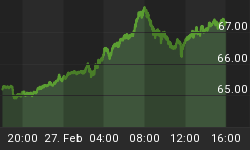Going into OPEX last week options traders had been favoring puts over calls at the widest margin since the bear market bottom in March 2009. During the volatility of OPEX, the CBOE equity-only put/call ratio spiked even higher than the previous week. As I mentioned in my past notes, I typically don't give much weight to sentiment surveys in the conventional sense because traders vote with their wallets and not their mouths. The put/call ratio can offer more practical insight into which posture they are actually carrying.
I tend to gravitate towards data series at the extremes because it washes out the noise. The below chart was constructed with the weekly CBOE equity-only put/call ratio. However, I hid the actual data series and highlighted its rate of change (ROC). As you can see, the ROC over the past few weeks is historically extreme.
Interestingly, when presented as a ROC metric - it exhibited the greatest change since 2004; the time period in which the market digested uncertainty in a sideways fashion as the Fed embarked on removing the historic accommodative monetary policies.
Sound familiar?
I refer to it as the Congruent Market Theory.

More to come in this line of thinking in Short Term Scale - Part III, tomorrow.
Hat tip - Stock Trader's Almanac
I just joined Twitter. All my trades and occasional market musings are disclosed in real-time here.















